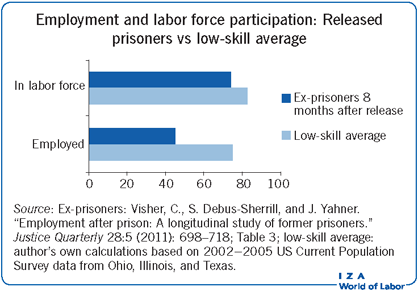Elevator pitch
The majority of individuals released from prison face limited employment opportunities and do not successfully reintegrate into society. The inability to find stable work is often cited as a key determinant of failed re-entry (or “recidivism”). However, empirical evidence that demonstrates a causal impact of job opportunities on recidivism is sparse. In fact, several randomized evaluations of employment-focused programs find increases in employment but little impact on recidivism. Recent evidence points to wages and job quality as important determinants of recidivism among former prisoners.

Key findings
Pros
Improvements in aggregate labor market conditions are associated with decreases in aggregate crime rates.
Recent evidence suggests that increases in wages for low-skilled workers and opportunities in sectors that pay higher wages to low-skilled workers can reduce recidivism among individuals recently released from prison.
Providing employers with information on offender rehabilitation and relief from potential liability can expand employment opportunities for ex-offenders.
Cons
Released prisoners face substantial obstacles such as substance abuse, mental health disorders, and social and family problems that dwarf any potential impact of employment on recidivism.
Several randomized evaluations of employment-focused re-entry programs report increases in post-prison employment rates that are not associated with large changes in recidivism.
Employment opportunities for released prisoners are scarce due to low levels of education and limited work experience as well as an aversion among employers to hire them.